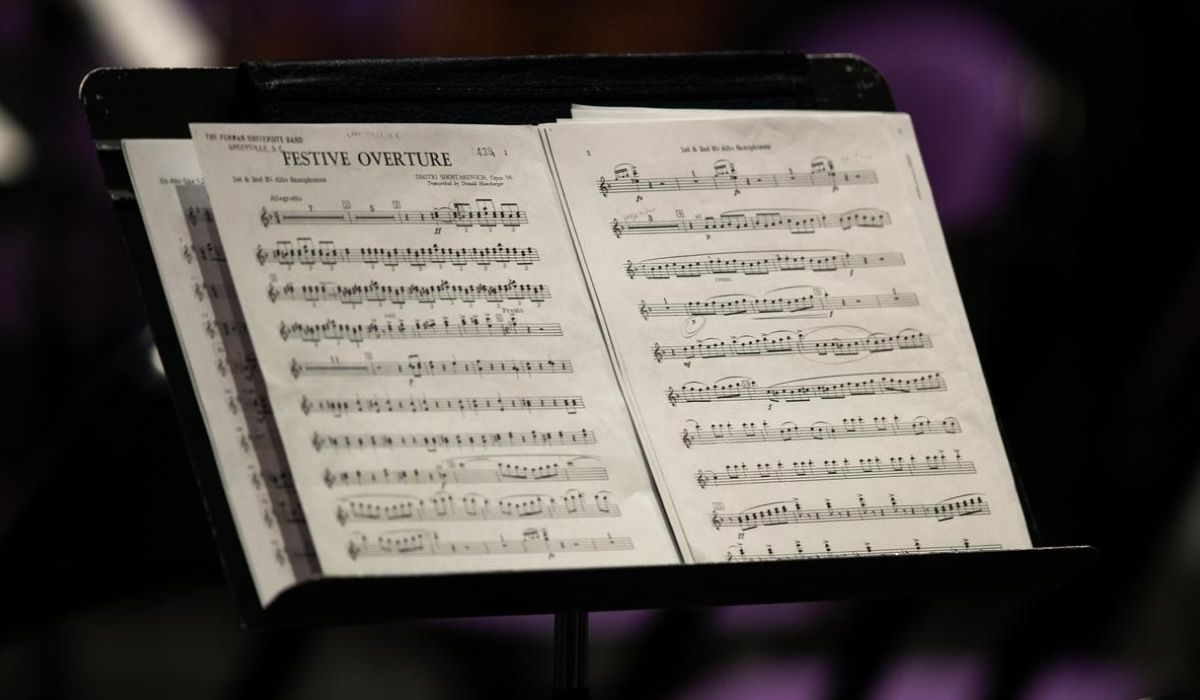Home>Production & Technology>Music Theory>How Long Does It Take To Get A Music Theory Degree


Music Theory
How Long Does It Take To Get A Music Theory Degree
Modified: February 1, 2024
Earn your music theory degree, and join the ranks of skilled musicians and composers. Discover how long it takes to complete your studies and embark on a rewarding musical journey.
(Many of the links in this article redirect to a specific reviewed product. Your purchase of these products through affiliate links helps to generate commission for AudioLover.com, at no extra cost. Learn more)
Table of Contents
- Introduction
- What is a Music Theory Degree?
- Courses in a Music Theory Degree Program
- Duration of a Music Theory Degree Program
- Factors Affecting the Time Required to Complete a Music Theory Degree
- Accelerated Music Theory Degree Programs
- Online Music Theory Degree Programs
- Job Opportunities with a Music Theory Degree
- Conclusion
Introduction
Music theory is a fundamental aspect of understanding and creating music. It encompasses the study of notation, harmony, rhythm, and structure, providing a framework for musicians to analyze and interpret musical compositions. If you have a passion for music and a desire to deepen your understanding of its inner workings, pursuing a music theory degree can be a rewarding and fulfilling path.
A music theory degree is an academic program that focuses on the principles and concepts behind music composition, analysis, and performance. It provides students with a comprehensive knowledge of musical forms, scales, chords, and harmonies, enabling them to explore the intricate nuances of different music genres and styles.
This degree program not only hones your theoretical understanding of music but also offers practical training in areas such as ear training, sight-reading, and score analysis. By delving into the intricacies of music theory, you can enhance your musical abilities and develop a critical ear, enabling you to appreciate and interpret music on a deeper level.
Whether you aspire to become a composer, conductor, music teacher, or even a professional performer, a music theory degree can pave the way for a successful career in the music industry. It equips you with the skills and knowledge necessary to excel in a variety of professional roles and opens doors to exciting opportunities in both the academic and performance spheres.
In the following sections, we will delve deeper into the structure and content of a music theory degree program, the factors that can affect the time required to complete it, as well as explore options such as accelerated and online degree programs. Additionally, we will discuss the job prospects and opportunities available to those with a music theory degree.
What is a Music Theory Degree?
A music theory degree is an academic program that focuses on the study of musical concepts, structures, and notation. It provides students with a deep understanding of the technical aspects of music and equips them with the skills necessary to analyze, interpret, and compose music.
Within a music theory degree program, students are exposed to a range of topics that include harmony, counterpoint, music analysis, composition techniques, and music history. They learn to identify and analyze musical structures, recognize different chord progressions, and study the principles behind rhythm and melody. Additionally, students gain proficiency in reading and interpreting written music through score analysis and sight-reading exercises.
Music theory degrees are typically offered at the undergraduate and graduate levels. At the undergraduate level, students can pursue a Bachelor of Arts (BA) or Bachelor of Music (BM) in music theory. These programs provide a broad foundation in music theory, along with opportunities to explore other aspects of music, such as performance or composition.
At the graduate level, students can opt for a Master of Arts (MA) or Master of Music (MM) in music theory. These programs delve deeper into advanced concepts and research methodologies, allowing students to specialize in specific areas of interest. Graduate students may also have the opportunity to teach music theory courses or undertake independent research projects.
While a music theory degree primarily focuses on the theoretical and analytical aspects of music, it also incorporates practical elements. Students are often required to take courses in ear training, where they develop their ability to identify and reproduce musical intervals, chords, and melodies by ear. They may also be encouraged to participate in ensembles or perform on their primary instrument, providing them with a well-rounded musical education.
Overall, a music theory degree equips students with a comprehensive understanding of music’s inner workings and prepares them for a variety of career paths within the music industry. Whether their aspirations lie in composition, music education, or research, a music theory degree provides a strong foundation upon which to build their future endeavors.
Courses in a Music Theory Degree Program
A music theory degree program typically offers a diverse range of courses that cover various aspects of music theory, analysis, and composition. These courses provide students with a comprehensive understanding of the fundamental principles and techniques used in music creation and interpretation. Here are some common courses you can expect to find in a music theory degree program:
- Music Theory Fundamentals: This introductory course lays the foundation for studying music theory. Students learn about notation, scales, intervals, and basic harmony principles. They also gain proficiency in sight-reading and aural skills.
- Harmony and Counterpoint: This course explores the principles of harmony and counterpoint, focusing on chord progressions, voice leading, and harmonic analysis. Students learn how to construct harmonies and study the rules and conventions of counterpoint.
- Music Analysis: In this course, students delve into the analysis of musical compositions from various genres and time periods. They learn how to analyze and interpret the harmonic, melodic, and structural elements of a piece of music.
- Form and Analysis: This course focuses on the study of musical forms, including sonata form, fugue, and rondo. Students examine the structure and organization of these forms and develop skills in identifying and analyzing them in different compositions.
- Orchestration and Arranging: This course introduces students to the principles of orchestration and arranging. They learn how to effectively manipulate instrumental and vocal textures, understanding how different instruments and voices work together in an ensemble setting.
- Composition Techniques: Students in this course explore various composition techniques, such as serialism, minimalism, and post-tonal approaches. They learn how to apply these techniques to create original compositions and develop their unique musical style.
- Music History: A music theory degree often includes courses in music history to provide students with a broader context for their studies. These courses cover significant periods, genres, and composers, helping students understand the evolution of music throughout history.
- Analysis of Popular Music: Some programs offer courses specifically focusing on the analysis of popular music. Students learn to analyze the harmonic, rhythmic, and melodic components of popular songs from different genres and explore the cultural and social implications of these compositions.
- Research Methods in Music: Graduate-level programs may include courses in research methods, equipping students with the necessary skills to conduct scholarly research in the field of music theory. They learn about data collection, analysis, and writing research papers.
- Capstone Project: As the culmination of their music theory degree, students may be required to complete a capstone project. This could involve composing an original piece of music, conducting an in-depth analysis of a complex composition, or conducting research on a specific music theory topic.
These are just a few examples of the courses that you may encounter in a music theory degree program. The specific courses can vary depending on the institution and the level of the program. Through these courses, students develop a strong theoretical foundation and gain the skills necessary to excel in the field of music theory.
Duration of a Music Theory Degree Program
The duration of a music theory degree program can vary depending on the level of the program and the educational institution. Generally, undergraduate programs in music theory typically take around four years to complete. These programs often result in a Bachelor of Arts (BA) or Bachelor of Music (BM) degree.
During the first two years of an undergraduate music theory program, students typically complete general education requirements alongside introductory music courses. These introductory courses provide students with a solid foundation in music theory fundamentals, music history, and performance skills.
In the latter two years of their undergraduate program, students focus more specifically on music theory coursework. They delve deeper into advanced topics such as harmony, counterpoint, music analysis, and composition techniques. They may also have the opportunity to undertake independent research or complete a senior project related to their area of interest in music theory.
Graduate-level programs in music theory, such as a Master of Arts (MA) or Master of Music (MM), typically require an additional two years of study beyond the undergraduate level. These programs are often more research-intensive and may include specialized coursework tailored to the student’s interests and career goals.
Some institutions offer accelerated programs that allow students to complete their music theory degree in a shorter timeframe. These accelerated programs condense the coursework and require a more intensive course load, enabling students to graduate sooner. The duration of these programs can vary, but they often range from two to three years.
It’s important to note that the duration of a music theory degree program can also be influenced by factors such as part-time or full-time enrollment, the availability of certain courses, and the requirement of internships or performance experiences. Additionally, some programs may offer the option for students to take summer courses, which can expedite the completion of the degree.
Ultimately, the time required to complete a music theory degree program will depend on various factors, including the level of the program, the student’s course load, and their individual progress. It is advisable for prospective students to consult with academic advisors and review program requirements to get a clear understanding of the expected duration of their specific music theory degree program.
Factors Affecting the Time Required to Complete a Music Theory Degree
The time required to complete a music theory degree can vary depending on several factors. While the standard duration of a program is typically four years for an undergraduate degree and an additional two years for a graduate degree, individual circumstances and choices can affect the overall timeline. Here are some factors that can influence the time needed to complete a music theory degree:
- Course Load: The number of courses taken per semester can significantly impact the degree completion time. Students who enroll in a heavier course load, such as taking more credits each semester or participating in summer courses, may be able to complete their degree requirements more quickly.
- Part-time or Full-time Enrollment: Students who choose to enroll part-time will naturally take longer to complete the degree as they are taking a reduced number of courses each semester. Conversely, full-time students can take a standard course load and may be able to complete their degree within the standard timeframe.
- Internships or Performance Requirements: Some music theory degree programs may have internships or performance requirements, such as ensemble participation or solo performances. Meeting these obligations may require additional time, especially if students must balance these requirements with their academic coursework.
- Individual Progress and Readiness: Every student progresses at their own pace. Some students may excel in their coursework and be able to complete degree requirements more quickly, while others may require additional time to grasp certain concepts or complete assignments. It’s important to allow flexibility to accommodate individual learning styles and readiness.
- Double Majors or Minors: Students who choose to pursue a double major or minor alongside their music theory degree may require more time to complete all the necessary coursework. Balancing multiple areas of study can be rewarding but may extend the overall time needed to graduate.
- Availability of Required Courses: The availability of specific music theory courses, especially those at the advanced level, can impact the time needed to complete a degree. If certain courses are only offered once a year or have prerequisites, students may need to plan their schedule accordingly and be mindful of potential course conflicts or delays.
- Research or Thesis Requirements: Some music theory programs require students to undertake research projects or complete a thesis as part of their degree requirements. These projects can take additional time to plan, conduct, and write up, potentially extending the overall time needed to graduate.
It’s essential for prospective students to carefully review the curriculum and program requirements of their intended music theory degree. By understanding these factors and planning their course schedule accordingly, students can make informed decisions to ensure a manageable workload and timely degree completion.
Accelerated Music Theory Degree Programs
For students seeking to complete their music theory degree in a shorter timeframe, accelerated music theory degree programs can be an attractive option. These programs are designed to condense the coursework and requirements, allowing students to graduate sooner than traditional degree pathways. While the specific structure and timeline can vary between institutions, accelerated programs typically offer an expedited route to degree completion.
One common approach in accelerated music theory degree programs is a more intensive course load. Students in these programs often take a higher number of credits per semester, sometimes including summer courses, to cover the necessary coursework in a shorter period. By assuming a heavier academic load, students can accelerate their progress and graduate earlier than those in standard degree programs.
Another method employed by accelerated programs is the incorporation of focused and streamlined curriculum. These programs typically offer a carefully curated selection of courses that cover essential music theory concepts and skills without the inclusion of extensive electives or specialized study areas. By focusing on the core requirements of the degree, students can efficiently progress through the program and achieve their degree in a shorter span of time.
Accelerated programs may also make use of prior learning assessment or credit transfer options. This allows students with relevant prior coursework, professional experience, or musical proficiency to receive credits that can be applied towards their music theory degree. By recognizing and valuing their existing knowledge and competencies, students are able to bypass certain courses or requirements, reducing the total time needed to complete the degree.
It’s important to note that while accelerated music theory degree programs offer a more expedited path to graduation, they require a higher level of dedication, time management, and academic rigor. The condensed schedule and increased workload can be challenging, and students should be prepared for an intensive educational experience. However, for highly motivated individuals who can handle the demands, these programs can be a great opportunity to achieve their career goals quickly.
Prospective students interested in pursuing an accelerated music theory degree should research and consult with academic advisors to ensure they understand the specific requirements, expectations, and potential challenges of the program. By carefully planning their course schedule, managing their time effectively, and seeking support when needed, students can successfully navigate an accelerated program and obtain their music theory degree in a shorter timeframe.
Online Music Theory Degree Programs
In recent years, the availability and popularity of online education have expanded, including in the field of music theory. Online music theory degree programs offer flexibility and convenience for students who may not have the opportunity to attend a traditional on-campus program. These programs allow individuals to pursue their music theory education remotely, accessing course materials and engaging with instructors and peers through online platforms.
Online music theory degree programs often mirror the curriculum and coursework found in on-campus programs. Students can expect to take courses in music theory fundamentals, harmony, counterpoint, music analysis, composition techniques, and more. The advantage of online programs is that students have the freedom to complete their coursework at their own pace, from the comfort of their own homes.
Distance learning through online programs allows students to schedule their studies around their other commitments, such as work or family obligations. This flexibility is particularly beneficial for individuals who are already working professionals and want to earn their music theory degree while maintaining their existing responsibilities.
Online education in music theory also opens up opportunities for students to study with instructors and collaborate with peers from around the world. Through virtual classrooms, discussion boards, and video conferencing, students can engage in meaningful collaborations and discussions with a diverse community of fellow musicians and instructors.
While the coursework for online music theory degree programs is primarily delivered through virtual platforms, some programs may also have in-person requirements for certain components, such as ensemble performances or practical assessments. These requirements may vary depending on the institution and program, so it’s essential to research and understand the specific expectations and limitations of each program.
Prospective students considering an online music theory degree program should ensure that the program they choose is accredited and recognized by relevant educational bodies. Accreditation ensures that the program meets certain quality standards and that the degree earned will be respected and accepted in professional settings.
Overall, online music theory degree programs offer flexibility, convenience, and access to quality education for individuals passionate about studying music theory. Through these programs, students can pursue their academic and career goals while maintaining their personal and professional commitments. As technology advances, online education continues to evolve, providing more opportunities for students to explore their passion for music theory from wherever they are in the world.
Job Opportunities with a Music Theory Degree
A music theory degree can open doors to a wide range of exciting career opportunities within the music industry. While some careers may specifically focus on music theory, this degree also provides a strong foundation for various music-related professions. Here are some potential job opportunities for individuals with a music theory degree:
- Music Teacher/Instructor: With a music theory degree, you can pursue a career as a music teacher or instructor, either in private lessons or in educational institutions. You can teach music theory, composition, or an instrument, sharing your knowledge and passion for music with students of all ages.
- Composer/Arranger: A music theory degree equips you with the skills to compose and arrange music. You can create original compositions for various genres and mediums, such as film, television, video games, or live performances.
- Music Director/Conductor: With an understanding of music theory and performance, you can work as a music director or conductor. You can lead musical performances, orchestras, choirs, or bands, interpreting and guiding musicians to create captivating performances.
- Music Analyst/Critic: A music theory degree can lead to a career as a music analyst or critic. You can analyze and critique musical compositions, performances, or trends, providing valuable insights and evaluations for publications, media outlets, or online platforms.
- Music Librarian: Music theory graduates may find opportunities in libraries or institutions as music librarians. In this role, you would manage and curate collections of musical scores, recordings, and other resources, helping researchers, performers, and educators access valuable materials.
- Music Researcher: With a music theory background, you can pursue a career as a music researcher. You can conduct scholarly research, analyze music trends, study historical aspects of music, or contribute to the advancement of music theory knowledge through academic publications.
- Music Editor/Publisher: Music theory graduates can work as music editors or publishers, curating and editing musical scores, creating editions of musical works, and overseeing the publishing process. They play a crucial role in ensuring the accuracy and accessibility of musical compositions.
- Music Technology Specialist: Given the intersection of music theory and technology, graduates can explore careers as music technology specialists. They can work in areas such as sound design, audio engineering, software development for music production, or music software instruction.
- Music Therapist: Music theory knowledge can be valuable in the field of music therapy. By combining musical understanding with therapeutic techniques, music theory graduates can help individuals improve their well-being and achieve therapeutic goals through music.
- Arts Administration: Music theory graduates can pursue careers in arts administration, working for music organizations, festivals, or concert venues. They can handle aspects of concert production, programming, marketing, fundraising, or managing music education programs.
These are just a few examples of the career paths available to individuals with a music theory degree. The versatility of this degree allows graduates to pursue various roles within the music industry, utilizing their analytical skills, creative abilities, and comprehensive understanding of music theory.
It’s essential for music theory graduates to network, gain practical experience, and continue their professional development to enhance their career prospects. By actively engaging in the music community and staying up to date with industry trends, graduates can find fulfilling and rewarding opportunities in their chosen field.
Conclusion
A music theory degree offers a deep understanding of the principles and intricacies of music, providing a solid foundation for a variety of exciting career paths. Through coursework that covers topics such as harmony, counterpoint, music analysis, and composition techniques, students develop analytical and creative skills that can be applied in various professional settings.
Whether you choose to become a music teacher, composer, conductor, music analyst, or pursue another career in the music industry, a music theory degree can open doors to fulfilling opportunities. The duration of a music theory degree program can vary, typically taking four years for an undergraduate degree and an additional two years for a graduate degree. However, factors such as course load, part-time or full-time enrollment, and the availability of required courses can affect the time required to complete the degree.
Accelerated music theory degree programs offer a shorter path to graduation by providing a more intensive course load or allowing for credit transfer. Online music theory degree programs provide flexibility for students to pursue their education remotely and at their own pace, with the added advantage of global collaboration and networking opportunities.
With a music theory degree, there are diverse career opportunities within the music industry. Whether you choose to teach, compose, analyze, research, or work in arts administration, your music theory knowledge will guide you. The degree equips you with the skills and understanding necessary to excel in various music-related professions.
As you embark on your music theory journey, it’s important to stay curious, network, and continue to grow as a musician and professional. Engaging with the music community, participating in performances, and continuously expanding your knowledge will enhance your career prospects and help you develop a thriving career in the field.
Whether you’re passionate about analyzing complex compositions or creating your own musical masterpieces, a music theory degree will provide you with the tools and knowledge to pursue your dreams. Take the first step on this rewarding path and explore the possibilities that await you with a music theory degree.











